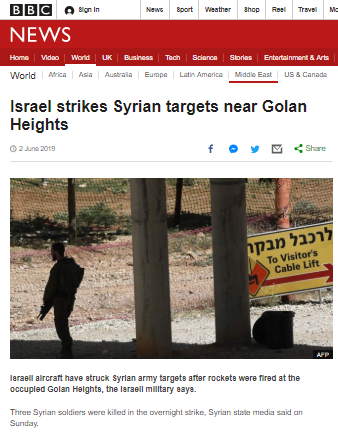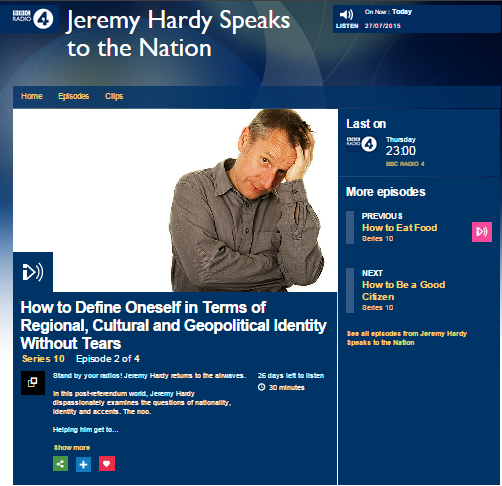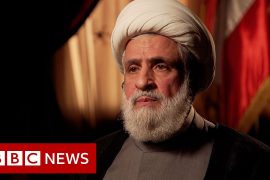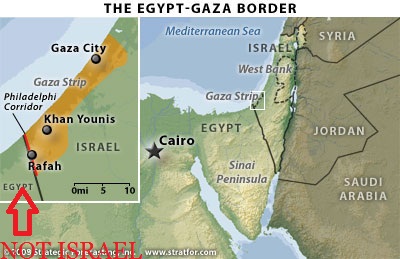June 6th saw the appearance of a report titled “Could Ramallah become an Arab World tech hub?” in the ‘Features & Analysis’ section of the BBC News website’s Middle East page and on its Technology page. A similar filmed report on the same topic, also by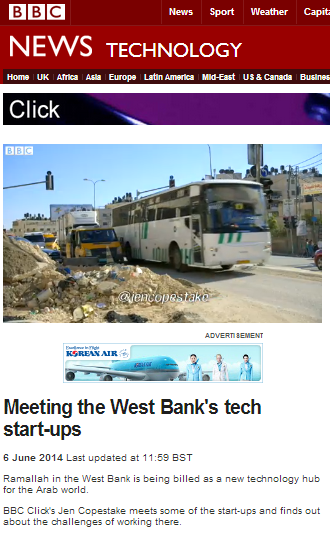 BBC Click’s Jen Copestake and titled “Meeting the West Bank’s tech start-ups“, appeared in addition on the website’s Technology page.
BBC Click’s Jen Copestake and titled “Meeting the West Bank’s tech start-ups“, appeared in addition on the website’s Technology page.
Both these reports are offshoots of part two of the series by BBC Click previously mentioned here. Unfortunately – and in stark contrast to BBC Technology’s usually good reporting from the region – this second episode (aired on the BBC News channel and on BBC Two) ventured beyond the topic of technology into pastures political.
In the written version of her report, Copestake states:
“Pinch Point, a gaming company, has just created a video game called Sperm Mania.
Beyond the shock value of the title, CEO Khaled Abu AlKheir sees a story in the game that reflects their lives under occupation: the sperm have an extremely difficult journey to fertilise an egg, with only one in 300 million succeeding.
“Everything we do is faced with challenges so always have to think outside the box, whether it’s a service or a game,” says Mr Abu AlKheir.” [emphasis added]
She continues with an unexplained and opaque reference to “sanctions”, despite the fact that the economic sanctions imposed on the PA by the Quartet and Israel in January 2006 after the terrorist organisation Hamas’ win of the PLC elections, came to an end seven years ago, in June 2007, with the Hamas coup in the Gaza Strip.
“In the West Bank, it is a different story. In Ramallah, the unofficial capital of the occupied territories, Palestinians are hopeful that investing in tech start-ups will help lift them out of a struggling economy stifled by sanctions.”
Later on, readers are told that:
“Growing up in Yata, Mr Shreateh’s school did not have the best computer lab. He says his school relied on foreign aid donations to buy computers.”
Notably, the topic of government investment in computer education and tech start-ups (which is related, of course, to the subject of the PA’s financial priorities that include spending 6% of its budget on payments to convicted terrorists and their families) is not part of Copestake’s story, but her report does include a curious statement which could lead readers to form the inaccurate impression that residents of the PA controlled areas do not have passports. The PA has been issuing passports since 1995.
” “This is what is good in technology, it breaks the borders. A person with a laptop can work in the worst cases, he can work from his home and interact with the global community,” says Husni Abu Samrah.
“Without the passport and despite the occupation. It is limitless,’ he adds.”
The report also states:
“The separation barrier dividing Israel and the occupied territories is the most obvious obstacle, but there are other major hurdles to technological development.”
As has been the case in much recent BBC reporting, the anti-terrorist fence is misrepresented as a structure intended to divide between two areas and its real aim – the prevention of terror attacks – is erased from the picture presented to BBC audiences. Quite how or why that fence is supposed to be an “obstacle” to the development of the tech industry in PA-controlled regions is not clarified. Next, Copestake presents readers with a simplistic and inaccurate view of another supposed “hurdle”.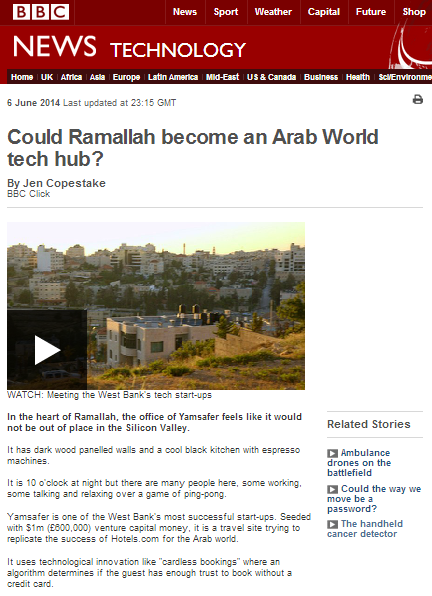
“Israel controls bandwidth in the occupied territories, and at the moment will not release access to the 3G network to Palestinian mobile companies.
The issue was highlighted on a recent trip to the West Bank by US President Barack Obama. Signs were put up around Ramallah telling him to leave his ubiquitous smartphone at home, as he would not be able to access a fast mobile network.”
Under the terms of the Oslo Accords signed by Israel and the PLO (Article 36, Annex III), a joint technical committee on telecommunications (JTC) was established. Some of that agreement’s clauses provide insight into the sort of issues that committee was established to address; not least that of potentially life-threatening interference with communications at Israel’s Ben Gurion airport – an issue with which the BBC is familiar.
“5. Both sides shall refrain from any action that interferes with the communication and broadcasting systems and infrastructures of the other side.
Specifically, the Palestinian side shall ensure that only those frequencies and channels specified in Schedule 5: List of Approved Frequencies (herein – “Schedule 5”) and Schedule 6: List of Approved TV Channels and the Location of Transmitters (herein – “Schedule 6″) shall be used and that it shall not disturb or interfere with Israeli radio communication activity, and Israel shall ensure that there shall be no disturbance of or interference with the said frequencies and channels.”
Since the PA’s decision to form a unity government with Hamas, the JTC’s operations have been suspended but prior to that, meetings were held between the two sides as the Ministry of Communications explained when BBC Watch enquired about the topic of 3G technology.
“The Israeli and Palestinian sides discussed several communication matters during the meetings of the Joint Technical Committee (JTC), attempting to come up with mutually agreed-upon solutions. Those matters also include the assignment of 3G frequencies.”
In fact, Israel proposed to the committee a plan which would facilitate the entry of operative 3G technology to the PA-controlled areas. No response was received from the Palestinian side.
It is not of course the case that there is no 3G technology available in PA-controlled areas. Users can already make use of roving technology provided by Israeli suppliers and, as is the case with some Israeli companies such as Hot Mobile and Golan Telecom, potential Palestinian suppliers would not need to have their own physical infrastructure in order to provide 3G service to their customers but could roam on existing ones, thereby reducing the number of antennae.
The 3G issue is of course not just a technical one, but a subject which – like water – has been politicized in order to advance a specific narrative. Regrettably, on this topic and others noted above, Jen Copestake did not ask the necessary questions in order to bring to BBC audiences the facts behind the politicized narrative she amplifies in her reports.

